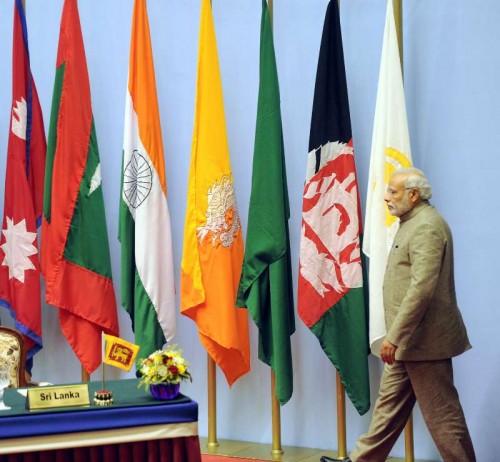
By Anil Giri
The 18th South Asian Association for Regional Cooperation (Saarc) Summit concluded in Kathmandu Thursday with the adoption of a 36-point Kathmandu Declaration.
During the Summit, a Saarc Framework Agreement on Energy Cooperation was signed while leaders of the South Asian nations directed their respective ministers to hold a meeting within three months to finalise the Saarc Motor Vehicles Agreement for the Regulation of Passenger and Cargo Vehicular Traffic, and the Saarc Regional Agreement on Railways.
The summit adopted the Kathmandu Declaration with the theme of “Deeper Integration for Peace and Prosperity” to deepen cooperation in core areas of trade, investment, finance, energy, infrastructure and connectivity.
The summit decided to accelerate the process of creating free trade in the region and formulation and implementation of projects, programmes and activities of Saarc in a prioritised, focused and result-oriented manner.
Similarly, the summit also agreed to launch regional and sub-regional projects in the agreed areas of cooperation, especially in the area of poverty alleviation, infrastructure building, connectivity and energy. Strengthening the SAARC Development Fund, effective implementation of the SAARC Action Plan on Poverty Alleviation with a view to making South Asian free from poverty and hunger and enhancing regional connectivity through building and upgrading roads, railways, waterways infrastructure, energy grids, communications and air links, was also agreed on.
The leaders also agreed to utilise youth power for socio-economic development, especially through creation of employment opportunities at home and building collective positions for their security and welfare while on employment outside the region.
The declaration called for combating terrorism in all its forms and manifestations and having effective cooperation among the member states for preventing the trafficking of people, arms and drugs and exploitation of children for forced labour.
Increasing agricultural productivity and ensuring food and nutritional security is also the part of the Kathmandu Declaration.
Providing quality education, eliminating illiteracy, providing vocational education and training, and making South Asia an attractive common tourist destination by promoting public-private partnership, are also mentioned in the declaration.
As a process of reform of Saarc institutions and mechanisms for making them more efficient, effective and result-oriented, the leaders have decided to close down three regional centers and decided to merge four regional centres, to avoid duplication of work, swift implementation of decisions and cost cutting measures.
The leaders have agreed to hold henceforth the Saarc summit meetings every two years, or earlier if necessary; the council of ministers once a year; the standing committee at least once a year; and the programming committee at least twice a year.
They have also agreed to make the programming committee a charter body of Saarc. The summit decided that the 19th Saarc Summit will be held in Pakistan.
This year’s summit had begun Nov 22 with the convening of a meeting of the Saarc programming committee. The standing committee met Nov 23-24, and the council of ministers Nov 25.
During the inaugural session Nov 26, leaders of the Saarc member countries delivered their policy statements reflecting their resolve and commitment for accelerating regional cooperation among the member states in the areas of common interest.
The observer-levl delegates also made statements touching upon the need for enhanced level of cooperation between Saarc member states and observer states.